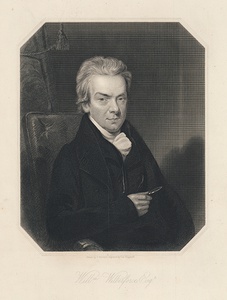| Method | Steel engraving |
| Artist | Charles Eden Wagstaff after James Stewart |
| Published | c. 1840 |
| Dimensions | Image 227 x 184 mm, Sheet 334 x 250 mm |
| Notes |
A half length, seated portrait of William Wilberforce. The print shows Wilberforce sat, turned slightly to his right, looking directly at the viewer. His right arm is resting on the arm of the chair, his hand lifted holding his spectacles. William Wilberforce (1759 - 1833) was a British politician, philanthropist, and a leading figure in the movement to abolish the transatlantic slave trade. Born in Hull, Wilberforce grew up in a wealthy merchant family. He attended St. John's College, Cambridge, where he developed a friendship with future Prime Minister William Pitt the Younger. Entering Parliament at just 21 years old and whilst still a student, Wilberforce initially focused on political reforms. However, a spiritual awakening in the 1780's profoundly changed his outlook, leading him to dedicate his life to social causes rooted in Christian faith. One of his most enduring commitments was to the abolition of slavery. Wilberforce became a key member of the Clapham Sect, a group of socially minded reformers. Through decades of relentless campaigning, he introduced anti-slavery motions to Parliament. Despite initial setbacks, his persistence paid off with the passage of the Slave Trade Act in 1807, which abolished the British transatlantic slave trade. His advocacy continued, culminating in the Slavery Abolition Act of 1833, passed just three days before his death on July 29, 1833. This act ended slavery across the British Empire. Apart from his abolitionist work, Wilberforce championed various social reforms, including education, animal welfare, and penal reform. His tireless dedication to the abolitionist cause cemented his legacy as one of history's great reformers. James Stewart (1791 - 1863) was a British reproductive engraver, mezzotinter, portrait, genre and landscape painter. Born in Edinburgh, Stewart produced works after William Allan and David Wilkie. In 1804 he studied under Robert Scott, then John Burnett and J. Graham II. In 1830, he was appointed member of the Royal Scottish Academy. In 1833 he emigrated to Cape Colony to work as a farmer, but after a year he returned to Britain, and worked as a teacher and portrait painter in Somerset. Charles Eden Wagstaff (fl. 1798 - 1850) was a British mezzotinter and engraver. Condition: Light spots of foxing to sheet. |
| Framing | unmounted |
| Price | £65.00 |
| Stock ID | 53340 |

